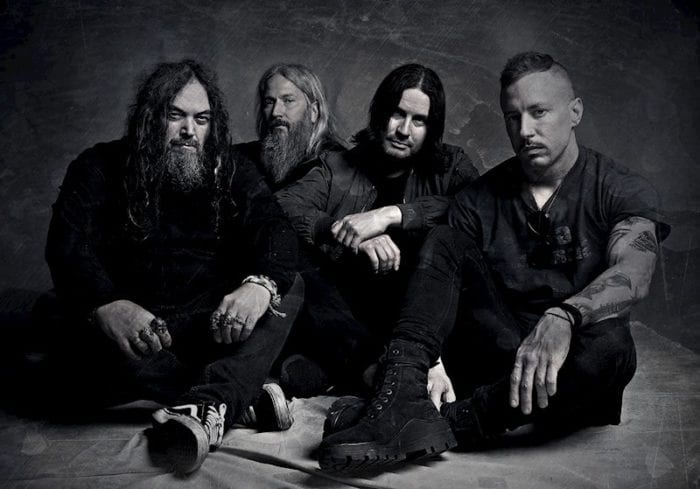
“It took years to record and to finally finish it up, but it was well worth the wait.”
Supergroups are one of those things where success depends on the talents involved. That can be said of any band, but ones in this distinguished category can be one of two things: a group of washed up has-beens aiming for one last chance at fame, or a few musicians from wildly different styles and backgrounds coming together to create something new.
Killer Be Killed, however, hits in its own unique category, as they’re best described as seriously badass artists teaming up to make some raucous heavy metal music. The ingredients: co-vocalist and co-guitarist Max Cavalera from Sepultura, Soulfly, and Cavalera Conspiracy; co-vocalist and co-guitarist Greg Puciato from the Dillinger Escape Plan; bassist and co-vocalist Troy Sanders from Mastodon; and drummer Ben Koller from Converge and Mutoid Man.
This mighty amalgamation recently released a second album, Reluctant Hero, on Nov 20 via Nuclear Blast Records, and it’s an absolute ripper. I spoke with Koller about the making of the album, virtual streaming, band chemistry, and upcoming collaborations.
Reluctant Hero is the first album you’ve done with Greg, Troy, and Max, so how was the experience of making it?
Absolutely amazing. It took years to record and to finally finish it up, but it was well worth the wait and I couldn’t be happier with the end result. It did take quite a long time to get everything together since we all have so much going on. We had multiple rehearsals all over the country and we did a tour of Australia in 2015, which is the last time we played shows together. That was actually the first time the band ever played shows so you can imagine that it takes a lot of effort and a lot of planning to get us all together to make this thing happen.
It’s finally here and I’m so excited, I couldn’t be happier with it and it’s one of the most exciting albums I’ve ever been a part of. I’m really, really stoked.
When it comes to how the band operates and the songwriting process, are there major differences between how you guys do it versus the way Converge or Mutoid Man does it? Any similarities?
Every band is different and every band has their own process, no one does it exactly the same. Some bands do a lot more stuff remotely while trading riffs back and forth in Dropbox folders and over text messages, like little iPhone videos and stuff like that to get the juices flowing. Some bands need to be in a room together to flesh things out while some bands do everything in the studio with pre-production and production all being done together.
With Killer Be Killed, it’s very vibe oriented and we definitely thrive while all being in a room together and working things out in the room … and just working off each other. We just need to have the vibe off all of us together to really make the songs materialize, which is a bit different than the other bands I’m in.
It can feel a lot more mechanical and painstaking in Converge sometimes and in Mutoid Man there’s a lot of riff trading back and forth with iPhone videos and stuff. We kind of piece together things remotely and then we work it out, but with Killer Be Killed it’s all vibe, it’s all in the room and it’s all giving our musical energy to each other and making the songs materialize like that.
One of the biggest things in music this year when it comes to virtual streaming has been the numerous covers that the YouTube channel Two Minutes To Late Night has done with a variety of musicians. Through being part of Mutoid Man, you’ve taken part in socially distanced renditions of AC/DC’s “Riff Raff” and White Zombie’s “Super-Charger Heaven,” among others. Who decides which songs get covered and who gets to perform on them? Is it a random process? Or is it completely planned out?
For the Two Minutes To Late Night stuff, a lot of the time I don’t know who’s actually going to be performing in the video, which is kind of rad. I totally trust Jordan Olds’ vision, he’s pretty much the mastermind behind everything and I totally trust him to make something awesome. If I occasionally have a suggestion for a song, most of the time he’s down to do whatever. He’s such a workhorse and he’s so good at creating content, it’s crazy. He’s kind of the mastermind and then he passes it along to the people he thinks would be good for the song, everyone records their parts, and then the editing team pieces it all together.
You gotta give them a lot of credit because everyone is trying to make these recordings remotely under different circumstances. Some people have good gear, some people have not so good gear, some people are shooting videos from their kitchen and there’s all kinds of different equipment involved. Syncing the video with the audio seems like a complete nightmare to me, I have no idea how they do it and do it so well, but it’s a combination of Jordan being the idea man and everyone getting together to record their parts. In the post-production they somehow make it work, I’m so impressed with the results and I couldn’t be happier with what they’ve done so far. They’re doing great.
As a drummer, how awkward do these kinds of sessions get for you? You’re pretty much by yourself in a room making and recording the beats to a song, so do you not get to hear how you sound in your own recording until the finished product or do you listen to yourself before you send it in to make sure everything sounds ok on your end? How does it work for you?
It’s kind of different for every song. The first couple I did was right before COVID-19 hit, so we were able to have people in the studio with one of the producers there. He filmed with his video camera and I had another friend of a friend with a six-channel recorder recording the music so I had help. When the pandemic hit, I was pretty much on my own. Luckily I have a friend and collaborator, Jared Shavelson, engineering for me. He’s really crafty with all of the software so he helps me track while plugging in all the cords and wires.
The stuff I’m not so good at, he helps me out with, so I’ve been lucky with that. I’ve also been learning to use my electronic drum kit for the past six to seven months as well and that’s probably been the most painstaking thing, just because there’s so much to it. There’s so many little settings that if you get it wrong then the whole thing doesn’t work. I think the biggest challenge has been trying to record with the electronic kit, but every song is a little bit different and it’s certainly a challenge. It’s not what I’m used to as a drummer, I’ve always thrived in a studio while recording on real drums with a producer and engineer, or in a rehearsal room playing with the guys live, so it’s definitely very different and it certainly has its hurdles, but the end result is totally worth it once you get it done.
With Reluctant Hero being released, what’s next for you in the coming months? Do you have any other projects underway?
I definitely have a couple projects I’m working on, some new stuff that unfortunately I’m not allowed to talk about. Everyone involved wants to keep it a secret for a little while until we have things recorded, but there’s definitely some new collaborations and new bands popping up, which is pretty exciting. Again, it’s such a challenge to do all of this remotely. I have one new band where we’re writing everything remotely and we’ll hopefully be able to put out an EP next year, so that should be an interesting experiment. Converge is working on new stuff as well, hopefully I’m flying back out to Massachusetts soon to do some new stuff with them and Mutoid Man basically has almost an entire record ready to go.
The last time we were getting ready to record, it was right when COVID-19 hit, unfortunately. Those bands definitely have stuff coming up, and as soon as we’re able to get on the road, Killer Be Killed will be on tour and writing new stuff as soon as we can. In the meantime, I’m just playing it by ear, looking at the COVID-19 updates every day, and trying to figure out when it’s safe to get out there and start touring again. It’s looking like it’s still going to be another nine months to a year until it’s safe enough for that to happen. It’s going to be a lot of waiting around while trying to keep these various collaborations going and travel safely to do some recording when I can, that’s pretty much it.
killerbekilled.com
Rob Duguay is an arts & entertainment journalist based in Providence, RI who is originally from Shelton, CT. Outside of DigBoston, he also writes for The Providence Journal, The Connecticut Examiner, The Newport Daily News, Worcester Magazine, New Noise Magazine, Northern Transmissions and numerous other publications. While covering mostly music, he has also written about film, TV, comedy, theatre, visual art, food, drink, sports and cannabis.

